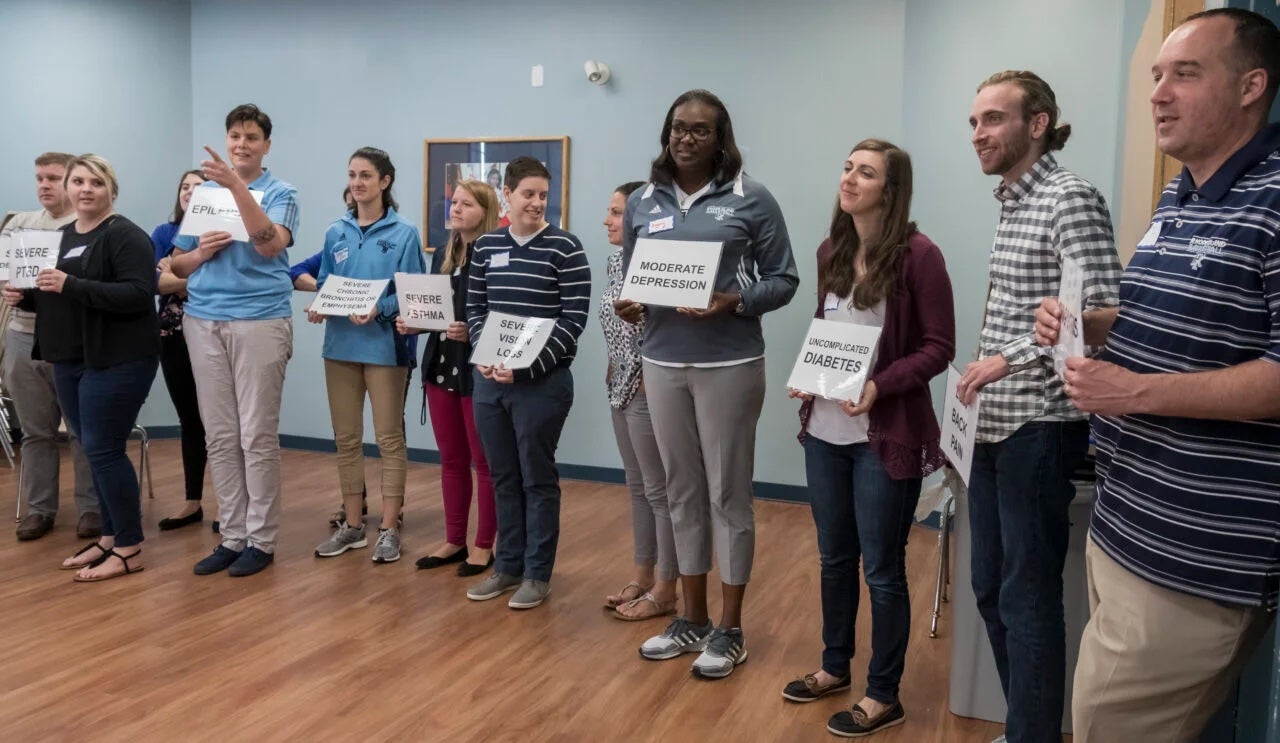URI is the first University in the state to offer Mental Health First Aid training.
When an accident happens, first aid delivered competently and quickly can mean the difference between a minor health scrape and a major one. The University of Rhode Island is applying that same approach to the mental health of its students, faculty and staff.

URI is the first university in the state to adopt Mental Health First Aid training, an eight-hour program that teaches people of all ages and walks of life to identify, understand and respond to signs of mental illness and substance use disorders.
The program has the full support of URI leadership, including President David M. Dooley, Donald H. DeHayes, provost and vice president for Academic Affairs, and Kathy Collins, vice president for the Division of Student Affairs. DeHayes first learned of Mental Health First Aid as a member of the steering committee for South County Healthy Bodies, Healthy Minds collaborative, which offers the training throughout southern Rhode Island. He and Collins completed the training before the fall semester began.
“It was clear to me we needed to do this. I wouldn’t let it go,” said DeHayes, noting data indicate that three quarters of mental health issues arise before age 24, a demographic largely represented at URI. “My sense is we have a responsibility to pay close attention to the issues and look after our community.”
By late September, over 300 people at URI already had been trained, including 185 resident assistants and academic mentors, said Lindsey Anderson, director of URI’s Psychological Consultation Center. A dozen staff and faculty — across disciplines and University roles — committed a full week in May to become certified Mental Health First Aid Instructors. By the end of the semester, Anderson expects URI to have trained between 400 and 500 people, including advisors, residence hall directors, staff members from the Dean of Students’ office, members of the Athletics department, graduate students across disciplines and the highest levels of URI’s administrative leadership, among others.
“You have people who have different roles in their departments. We are training people throughout the campus,” said Jacqui Tisdale, assistant director of outreach and intervention in the Dean of Students Office, which she and Anderson believe strengthens the program.
The URI training is tailored for higher education, Anderson said, including statistics, risk factors, cultural awareness and scenarios pertinent to a college campus. “We also want people to understand this doesn’t make them a superhero. It gives them a lexicon and deeper insight into what they see and how to take steps to get people the help they need,” Anderson said.
Mental Health First Aid, often called “CPR for the mind,” provides participants with mental health literacy on more common illnesses such as anxiety, depression and substance abuse, while also educating them about bipolar disorder, eating disorders, post traumatic stress disorder, schizophrenia and substance misuse, said Susan Orban, director of South County Healthy Bodies, Healthy Minds. “The program delivers the message that we can all do this,” she said. “It works.”
The training includes videos and mock scenarios and provides a step-by-step process to follow, which helps people stay calm, Anderson said. “You can lose your head in these highly charged situations. It is uncomfortable to talk about,” she said.
Antonia Balboni, a URI psychology major who completed the training, agreed. “For example, with schizophrenia, we learned how to approach the person and how to remain calm to — in turn — calm them down. Even I, as a psychology major, did not realize the importance of staying calm. To be able to learn how to be of help was an incredible experience,” she said.
Funding and support for the program come from the Rhode Island Department of Health, the U.S. Centers for Disease Control and Prevention, South County Health and the Institute for Integrated Health and Innovation, part of URI’s Academic Health Collaborative.
For more information on how to receive training, contact mhfa@etal.uri.edu.

